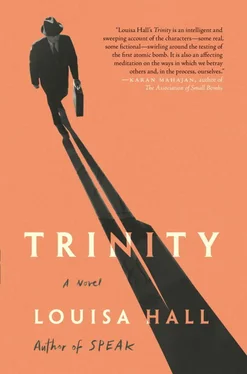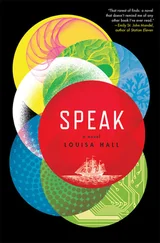The problem, I saw now, too late to change my reaction, was not that the bee had attacked me—the sting itself was a manageable pain—but that I hadn’t foreseen the attack. Like a bad reader who fails to pick up on obvious foreshadowing, I’d failed to know that the painful moment was coming, and to prepare myself for its arrival, perhaps to plan a less brutal retaliatory attack.
Then, in the parking lot of the grocery store, I felt a rush of weariness. I had to lean against the car for a moment. We only ever know things too late, I thought. Knowledge only comes when we’ve obliterated the need to possess it.
WHEN I’D RECOVERED MYSELF ENOUGH TO STAND UP AGAIN, Icrushed the bee under the toe of my sneaker. Afterward, it was nothing more than a smudge of black ash on the sidewalk, glamoured by faint iridescence.
People lie all the time, I thought, while starting the car and driving out of the lot. Behind me, in his car seat, my son blinked out at the world while it passed.
My husband lied to me for a long time. That wasn’t unforgivable. What was unforgivable was that I failed to foresee it.
THE FOLLOWING DAY, MY EDITOR CALLED ME AND ASKED ME IF I’Dwrite a piece on Robert Oppenheimer.
A kind of farewell, my editor said. A piece covering the span of his life, anticipating his final departure.
His death, I thought. Not his departure.
Why, I wondered, standing in the kitchen, talking on the phone, just as I had when I received that call from the woman who’d flown in from Chicago, do people insist on confusing deaths and departures?
ONCE I’D ACCEPTED THE ASSIGNMENT AND ARRANGED THE INTERVIEWwith Oppenheimer, I had three weeks to research his career before I met with him in his new office.
I had three weeks, in other words, to plan the questions I wanted to ask him: three weeks to prepare the right words, the phrases that would elicit the answers I needed, if I was going to get him to tell the whole story.
And of course that should have been plenty of time, but I was operating at something less than my usual capacity. Each time I began to prepare, I was overwhelmed by the prospect of attempting to speak with any real authority on the life of a man I’d never met, when—as I was beginning to realize more and more clearly—with each effort I made to know the man I’d chosen to marry, I only knew him less, as though my very attempts at knowledge were to blame for my dwindling certainty about the character of my husband. It seemed to me that any attempts at knowledge made in a state of fear or uncertainty—a state I’d lived in since I spoke to that woman from Chicago—were doomed to fail, and not only to fail but to further obscure the original subject.
And how, I thought, could I try to know a man like Oppenheimer—who created the weapons he did, who, though he probably didn’t intend to, ushered us into an era of anxiety unlike any era before ours—in any state other than fear and uncertainty?
By then, I was taking care of our son on my own, and having a hard time falling asleep. I moved through a fog. I had trouble working. Still, however, on a few ambitious afternoons, when our son was at day care, I headed to the library and unloaded myself onto one of the smooth plastic chairs in front of the microfiche.
Then, in a state of mesmerized detachment, I’d stare at images of mushroom clouds in various countries: the Trinity Test in the Jornada del Muerto desert, followed by explosions in Hiroshima and Nagasaki, followed by the Soviet tests of Joe 1, Joe 2, and Joe 3. And then the first real United States thermonuclear test, Ivy Mike, which incinerated an island in Eniwetok Atoll, followed by the Soviet test of the Sloika, followed by the U.S. test of Castle Bravo, which spread nuclear fallout over the Rongelap and Rongerik atolls, and poisoned the crew of a Japanese fishing boat, and polluted waters as far as Australia.
And those were only just a few of the tests. There were tests underwater, tests in outer space, submarine-launched tests, tests buried in craters.
Crime and retribution, over and over again, leading to the Soviet test of the Tsar Bomba, in 1961, the biggest bomb ever exploded, with a mushroom cloud seven times the height of Mount Everest, which destroyed all the buildings in a village thirty-four miles away from ground zero, could have caused third-degree burns sixty-two miles away, and shattered windows in Norway and Finland.
SITTING IN THE LIBRARY, I PERUSED PHOTOGRAPH UPON PHOTOGRAPHof mushroom clouds in various sizes and I felt no more or less nausea than I felt on a regular morning when I woke up and realized again that my husband was no longer with us.
Fear is a blind, selfish state. One morning, for instance, sitting in the library, I found again that photograph of those women in Hiroshima, their faces bandaged so that their eyes became gaps, absences I couldn’t begin to comprehend, sifting through the rubble of their former lives.
It was a photograph that had haunted me in my youth. It had given me years of nightmares, perhaps, in part, because of what I didn’t know about my mother’s family, about the people she’d left behind, and where they were, and what they’d suffered. But also simply because I couldn’t understand what those women were feeling, what they could possibly be feeling, in the wake of such an incomprehensible stroke of destruction, and to not understand them felt to me as a child to be an unforgivable thing, such incomprehension, as I knew even then, being the only possible explanation for how the decision could be made to destroy them.
But this time, in the library, when I saw that photograph again, I felt no more spark of kinship with the women in their bandages, no more desire to feel what they might have been feeling, than I would have if the photograph had been taken of dolls.
I looked at it flatly.
That’s just the truth. I don’t, of course, admit it with pride. It revolted me, even then, to sit there in the library and look at that picture so flatly.
Even then, I tried to force myself to feel it. I zoomed in on the images of those women. I examined them from all angles, trying to feel some spark of desire to know them.
But in the end, I could summon little real feeling for the catastrophe that they suffered. Their existence remained unforgivably distant.
AT NIGHT, AFTER SUCH DAYS OF INEFFECTUAL RESEARCH, MY SON AND Iate dinner together. I arranged a variety of options for him on the tray of his high chair, but he never ate them. He was appalled by the foods young children usually like. He rejected whatever I tried. He drank milk, and sometimes I could induce him to eat some mashed pears, but he was horrified by everything else.
I, too, often found that I was disgusted by the food on my plate. I felt if we both managed a few bites we’d done well. Afterward, I allowed him to sit in front of the TV, something he seemed to find soothing, though probably it was bad for his brain.
But then I found it soothing as well, watching him while he watched the TV, his pale face rapt in the gloom of the dark room, the television flashing, lozenges of colored light floating over his forehead.
DURING THE DAY, IN MY RESEARCH, I TRIED TO FOCUS ON WHAT WASimportant in understanding Oppenheimer.
I learned that he’d named the Trinity Test for a Donne poem. I read that, after the test, radioactive clouds drifted over towns as far as 120 miles from the test site, raining poisonous ash on cattle ranches along the Chupadera Mesa. I learned that the workers who were sent in to examine the site found thousands of dead turtles in the cracked sand, burned to death inside their shells.
I discovered, also, that the two plutonium hemispheres at the core of Oppenheimer’s bomb were originally plated with silver. This blistered as a result of the heat, and in the final test, the hemispheres were plated with gold.
Читать дальше












